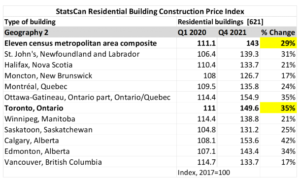 September 2022
September 2022
Condo boards are dealing with challenges few have considered.
For the best managed communities, condo fees are to increase by a substantial amount. It was incorrect to believe, for the last five years or more, that expenses were only increasing by a two percent rate of inflation. The actual rate of inflation in high-rise community expenses was considerably higher. Since 2020, non-inflationary increases include those pertaining to Covid among which are additional staffing and cleaning. For at least the coming year, we can anticipate inflationary expenses of eight percent or more. Shortages of materials and employees will delay most projects and could substantially add to cost increases.
Even before this recent inflation spike, the 2020 Auditor General of Ontario reports that 69 percent of surveyed condo boards did not have adequate funds to pay for major repairs. For some communities, the shortage is in millions of dollars.
The best-managed communities are likely to incorporate fee increases of eight percent or more. These are the communities that raised fees annually as expenses increased. They did many things the right way and may be able to limit condo fee increases to under 10 percent.
A great many high-rise communities can anticipate condo fee increases in the double digits. There remains no clear solution to avoid double digit increases without compromising on building maintenance, staffing, operations, safety and quality of life.
Understanding inflation
 Many condo boards have relied on the Consumer Price Index when raising fees by the implied inflation rate which was around two percent until recently. Unfortunately, this does not reflect cost increases in high-rise residential communities.
Many condo boards have relied on the Consumer Price Index when raising fees by the implied inflation rate which was around two percent until recently. Unfortunately, this does not reflect cost increases in high-rise residential communities.
A more realistic measure is the Residential Building Construction Index which better represents cost increases for high-rise communities. According to this index, costs have increased by 35 percent in the Toronto area between Q1 2020 and Q4 2021. Further increases in 2022, which may be substantial, are additional. These increases would apply to most major work in a building including elevators, façade, roofing, windows, caulking and renovations.
For communities that have relied on nominal fee increases of two percent since 2020, it would be necessary to increase fees by 35 percent, then an additional 10 percent (give or take) to reflect current inflation. For communities that have relied on nominal fee increases of two percent for longer, a 50 percent increase in condo fees may be necessary to avoid looming special assessments.
These recent cost increases constitute a new reality for some communities.

There are rumours that some financially compromised buildings have been “blacklisted” by lenders who are unwilling to provide mortgages to buyers. When reselling a unit in these communities, the only potential buyers are those who do not require a mortgage. Sellers find the resale value of these homes is much lower.
Higher condo fees will be opposed
 There will be opposition to substantial increases in condo fees. Some may be unable to pay them. They may have to divert funds from other sources or obtain a loan and readjust their personal finances. Condo boards will be unable to make special accommodations for personal situations. Some condo boards, owners or director-candidates will come out against raising condo fees and may even claim fees can be reduced. Justification for this position will likely come from those who have never reviewed condo expenses and have no practical understanding of how these expenses are changing. They may create “new math” purportedly in support of lower fees. As with the “new math” that has caused condo budgets to be out of alignment by failing to adjust for higher expenses, created a market to support bitcoin which is currently in collapse and other recent failures, their claims will soon fall victim to reality. Director-candidates hoping to win election by advocating for lower fees, or lower fee increases, with unsupportable claims will be most dangerous to communities choosing to believe them.
There will be opposition to substantial increases in condo fees. Some may be unable to pay them. They may have to divert funds from other sources or obtain a loan and readjust their personal finances. Condo boards will be unable to make special accommodations for personal situations. Some condo boards, owners or director-candidates will come out against raising condo fees and may even claim fees can be reduced. Justification for this position will likely come from those who have never reviewed condo expenses and have no practical understanding of how these expenses are changing. They may create “new math” purportedly in support of lower fees. As with the “new math” that has caused condo budgets to be out of alignment by failing to adjust for higher expenses, created a market to support bitcoin which is currently in collapse and other recent failures, their claims will soon fall victim to reality. Director-candidates hoping to win election by advocating for lower fees, or lower fee increases, with unsupportable claims will be most dangerous to communities choosing to believe them.
Reducing building operation costs
Raising condo fees is the only solution for communities that have been paying too little. Going forward, there are practices, technologies and systems that can reduce building operation and maintenance costs.
Condo management software reduces more than just office costs. Problems are more quickly identified so can be addressed when they escalate. Record keeping is simplified. Fewer mistakes are made. Management is better able to deal with resident concerns, understand building issues and control staffing. They can spend more of their time looking for further efficiencies.
The cost of insurance and dealing with damage is reduced when management has a greater awareness of utilities management in units. Metering systems for monitoring electricity use are most effective when complemented with an owner-pay system for electricity. Water detection systems identify water leaks more quickly and, when acted upon, dramatically reduce damage caused by water. Annual building-wide plumbing audits are a best practice for identifying water problems before serious damage occurs.
Energy efficiency initiatives provide long-term savings. Energy efficient lighting; heating, ventilation and air conditioning (HVAC); building automation systems and in-suite metering offer the greatest savings.
Once new systems, technologies or practices are implemented, it can take a couple of years until they are mastered and initial costs are recovered. Then begins a long period of reduced costs. Savings are typically reinvested to ensure this trend persists with future increases in condo fees being much less.







